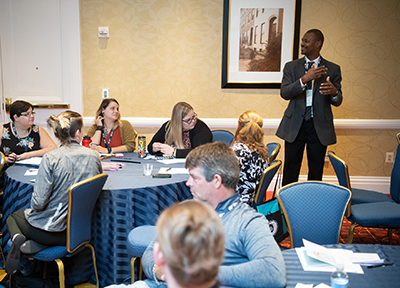University of Maryland School of Social Work Continuing Education Department
 We heard you! Come early & meet your colleagues!
We heard you! Come early & meet your colleagues!
From surveys completed after the 2018 Training Institutes, we learned that you wished the affinity groups could be held at the beginning of the conference , so we moved them! Come on June 30 to meet colleagues who work in your area and en joy this opportunity to connect!
Thinking Together Affinity Groups
Tuesday, June 30th from 2:30 p.m. - 4.00 p.m.

At the beginning of the 2020 Training Institutes, meet colleagues with similar interests and common goals. Share in the innovative work going on across the country and bring your stories and results to share with others. Contribute your ideas about the kinds of learning opportunities you would like to see offered by these learning communities in the coming year. You don't have to be a member to join!
Click the learning communities below to learn more about each.
Family Leadership ▾
Facilitators : This gathering of the Family Leadership Learning Community is your opportunity to share your innovative work and learn about what other family leaders and family-run organizations are doing. You are invited to highlight initiatives, accomplishments and activities related to innovative programs, legislative or policy initiatives, or special events. Please bring 50 copies of a brochure, handout, video link or infographic and be prepared to spend a few minutes describing your work. This is the ideal location to exchange ideas and resources and to network with others, so bring your business cards. It promises to be a rewarding start to your 2020 Training Institutes experience!
Early Childhood ▾
Facilitators : This gathering provides participants with an opportunity to discuss implementation, financing, and systems development regarding infant early childhood mental health (IECMH) efforts. Topics include IECMH Systems of Care, partnering with local and state agencies, tiered IECMH services from prevention to intensive treatment models, and mechanisms for addressing caregiver and family needs when addressing behavioral health needs of young children. This is an opportunity for open dialogue, peer sharing, and technical assistance. The facilitators use targeted discussion questions to guide the session and provide guidance for participants on ways to maximize their learning throughout the Institutes, from an early childhood perspective. The Early Childhood Learning Community is an opportunity for professionals working to support the needs of young children and families to dialogue throughout the year with peers and experts on a range of topics and models to support the development, growth and sustainability of integrated, comprehensive and collaborative infant and early childhood mental health systems.
Clinical High Risk & Early Psychosis ▾
Facilitators: This learning community meeting provides participants with an opportunity to discuss current efforts to integrate interventions for Clinical High Risk for Psychosis into local mental health systems. Topics include lessons from programs that have been implementing CHRp interventions, collaboration opportunities and resources, current research, implementation challenges, and problem solving. It provides an opportunity to network with individuals who are on the cutting edge of building a new field of early intervention in the U.S., share practical ideas and emerging knowledge, and connect with colleagues engaged in developing CHRp services nationwide.
Rural Mental Health ▾
Facilitators : This gathering provides participants with an opportunity to discuss challenges and innovations in developing Systems of Care for children, youth, and young adults with significant behavioral health needs and their families in rural areas. We welcome family members, youth, service providers, and all SOC stakeholders and partners working to build sustainable Systems of Care through high quality services and supports, improved access to care, and cultural responsiveness. Participants have the opportunity to engage in facilitated peer-to-peer learning by sharing current challenges and lessons learned, and receive technical assistance.
Cultural & Linguistic Competency ▾
Facilitators : Join this facilitated discussion focusing on building behavioral health equity for all populations and communities served by System of Care. Enjoy this opportunity for open dialogue, peer sharing, and technical assistance. Participants are invited to share their work in addressing mental health disparities through culturally and linguistically competent service delivery, and examine obstacles that communities face in accessing Systems of Care and behavioral health services. Using a modified Open Space Technology format, participants are asked to identify local priorities and challenges to promoting behavioral health equity in partnership with the communities and populations they serve. The meeting strives to develop a shared agenda that participants can use to continue planning and work to advance behavioral health equity.
Youth Leadership ▾
Facilitators : This gathering is designed for youth leaders, youth coordinators, supportive adults, and those interested in supporting youth voice to engage each other about what is possible in the youth engagement field. Youth voice is key to system transformation and youth engagement is an essential value in the System of Care philosophy. Come prepared to contribute your own experience and knowledge in discussions about enhancing youth engagement strategies, youth-adult partnerships, current gaps, opportunities to move the work forward, and about solidifying relationships between youth engagement experts and practitioners.
Social Marketing ▾
Facilitators : Join an informal conversation with peers from across the country for an opportunity to discuss audience research, messaging, and implementation of impactful social marketing. Bring your questions, concerns, challenges, and successes to share. Topics include maximizing events for their communications value, ensuring your content reaches your audience, measuring your results, and connecting with influencers in your community. Get a copy of the new Five Habits of Highly-Effective Social Marketers tip sheet and join in this opportunity for open dialogue, peer sharing, and technical assistance.
Young Adult Services & Supports ▾
Facilitators : This gathering brings together individuals who share a concern and passion for age appropriate and appealing system and supports for young adults. A forum to discuss and learn together about important and emerging trends to create better outcomes during the transition into adulthood is provided. This is a convening for all stakeholders in partnership with young adults and helps kick off the learning experience at the Institutes.
System of Care Leadership ▾
Facilitators : This gathering provides the opportunity for System of Care (SOC) leaders to engage in open dialogue, peer sharing, and technical assistance, with an emphasis on expanding and sustaining the SOC approach. Five core strategy areas are presented as an organizing framework for long-term system change—policy and partnerships, financing, services, training, and strategic communications. Brief examples from sites are highlighted in each area. Peer sharing of challenges and effective strategies follow, along with an opportunity to raise issues of concern related to SOC expansion and sustainability. Participation is encouraged for SOC leaders in any role, such as directors, coordinators, leaders in various content areas, and others who are championing this important work in states, communities, tribes, and territories across the nation, including those with and without federal grants.
Youth with Co-Occurring Substance Use & Mental Health Disorders ▾
Facilitators: This gathering provides participants an opportunity to discuss the implementation and provision of integrated treatment and supports to adolescents with co-occurring mental health and substance use concerns and their families. Topics include integrated care best practices; workforce development, training, and supervision; and incorporating integrated treatment and supports into local Systems of Care. This is an opportunity for open discussion, questions, and technical assistance.
Continuing Education Credits
Continuing Education Units (CEUs) are available for attendance at 2020 Training Institutes sessions. A CEU processing fee of $35 must be paid during the online registration process. Registration must be completed no later than July 2, 2020 in order to receive CEU credits.
Each participant may receive CEU credits only for the hours actually spent in training activities . Verification will be obtained by having name badges scanned in each session that is attended. Your name badge must be scanned at the conclusion of each session in order to determine the number of CEU credits you have earned. CEU credits cannot be awarded if your nametag has not been scanned. Scanning is not required for general sessions.

All attendees (that have their badges scanned) will receive a letter of attendance certifying participation in the training and the number of CEU credits earned. Participants are responsible for submitting this letter to their respective professional organizations, licensing entities, or employees in order to receive CEU credit. Letters of attendance will be issued following the Training Institutes via email.
In addition to the letter of attendance, participants may receive a CEU credit certificate from a professional organization. Applications have been submitted for CEU credit from the American Psychological Association (APA) and National Association of Social Workers (NASW) . If The 2020 Training Institutes are approved by these organizations, participants will also receive a certificate from the organization that is checked on the CEU application form. No additional fee is required.
You can apply for CEU Credits within your registration.
Source: https://theinstitute.umaryland.edu/2020traininginstitutes/participate/agenda/
0 Response to "University of Maryland School of Social Work Continuing Education Department"
Post a Comment